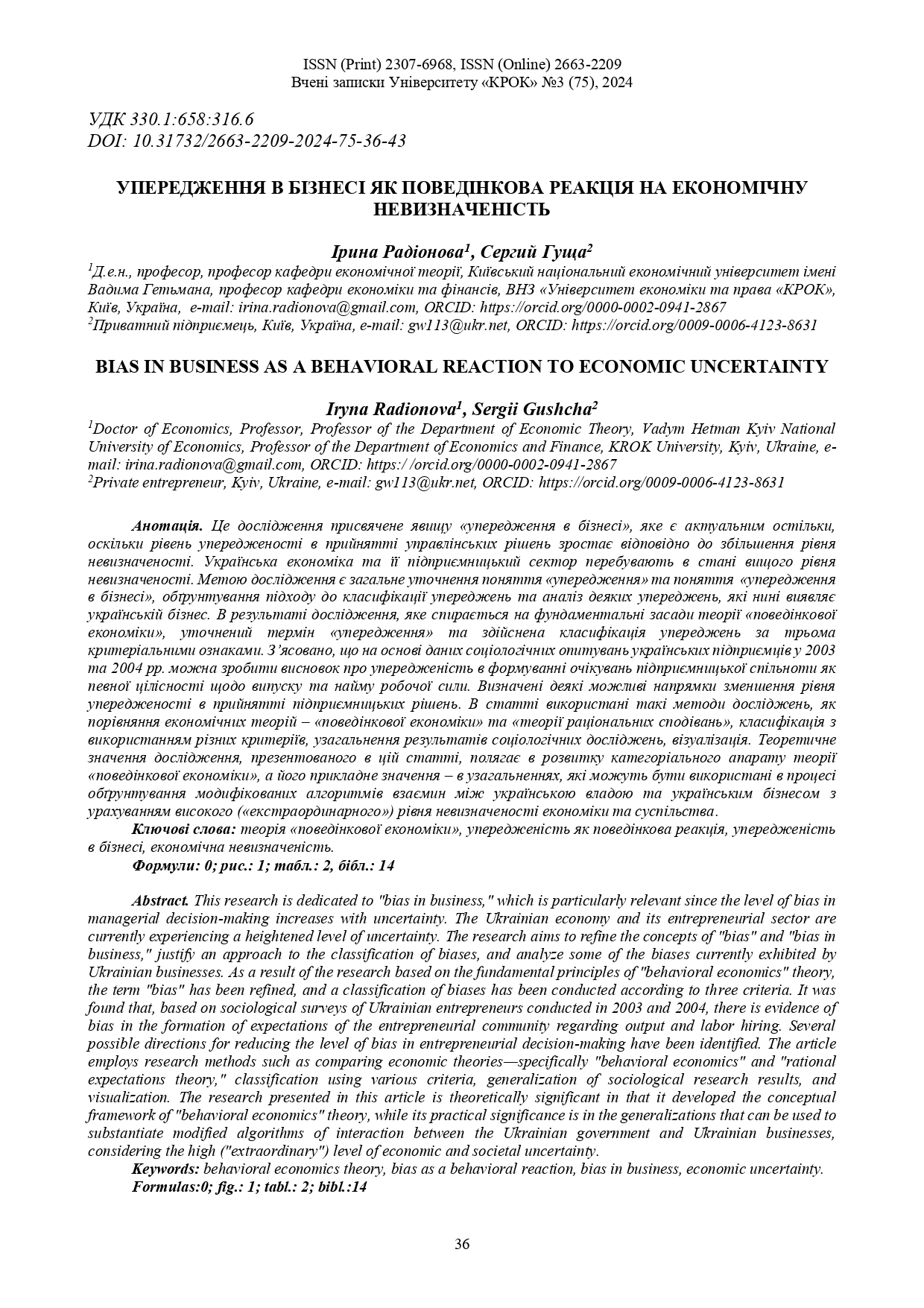BIAS IN BUSINESS AS A BEHAVIORAL REACTION TO ECONOMIC UNCERTAINTY
DOI:
https://doi.org/10.31732/2663-2209-2024-75-36-43Keywords:
behavioral economics theory, bias as a behavioral reaction, bias in busines, economic uncertaintyAbstract
This research is dedicated to "bias in business," which is particularly relevant since the level of bias in managerial decision-making increases with uncertainty. The Ukrainian economy and its entrepreneurial sector are currently experiencing a heightened level of uncertainty. The research aims to refine the concepts of "bias" and "bias in business," justify an approach to the classification of biases, and analyze some of the biases currently exhibited by Ukrainian businesses. As a result of the research based on the fundamental principles of "behavioral economics" theory, the term "bias" has been refined, and a classification of biases has been conducted according to three criteria. It was found that, based on sociological surveys of Ukrainian entrepreneurs conducted in 2003 and 2004, there is evidence of bias in the formation of expectations of the entrepreneurial community regarding output and labor hiring. Several possible directions for reducing the level of bias in entrepreneurial decision-making have been identified. The article employs research methods such as comparing economic theories—specifically "behavioral economics" and "rational expectations theory," classification using various criteria, generalization of sociological research results, and visualization. The research presented in this article is theoretically significant in that it developed the conceptual framework of "behavioral economics" theory, while its practical significance is in the generalizations that can be used to substantiate modified algorithms of interaction between the Ukrainian government and Ukrainian businesses, considering the high ("extraordinary") level of economic and societal uncertainty.Downloads
References
Thaler, R. H. (2015). Misbehaving: The making of behavioral economics. W. W. Norton & Company.
Kahneman, D. (2011). Thinking, fast and slow. Farrar, Straus and Giroux.
Kahneman, D., Sibony, O., & Sunstein, C. R. (2021). Noise: A flaw in human judgment. William Collins.
Akerlof, G. A. (2002). Behavioral macroeconomics and macroeconomic behavior. The American Economic Review, 92(3), 411–433. Retrieved from http://www.jstor.org/stable/3083349
Henriksen, M. (2020). Variational free energy and economics optimizing with biases and bounded rationality. Frontiers in Psychology. Retrieved from https://www.frontiersin.org/articles/10.3389/fpsyg.2020.549187/full
Ishfag, M., Nazir, M., Qamar, M. A. J., & Usman, M. (2020). Cognitive bias and the extraversion personality shaping. Frontiers in Psychology. Retrieved from https://www.frontiersin.org/articles/10.3389/fpsyg.2020.556506/full
Schwenk, C. H. (1986). Information, cognitive biases, and commitment to a course of action. Academy of Management Review, 11(2), 298–310.
Busenitz, L. W., & Barney, J. B. (1997). Differences between entrepreneurs and managers in large organizations: Biases and heuristics in strategic decision-making. Journal of Business Venturing, 12(1), 9–30.
Das, T. K., & Teng, B. (1999). Cognitive biases and strategic decision processes: An integrative perspective. Journal of Management Studies, 36(6), 757–778.
Simon, M., Houghton, S. M., & Aquino, K. (2000). Cognitive biases, risk perception, and venture formation: How individuals decide to start companies. Journal of Business Venturing, 15(2), 113–134.
Pethokoukis, J. (2023). Could AI really generate explosive economic growth? American Enterprise Institute. Retrieved from https://www.aei.org/articles/could-ai-really-generate-explosive-economic-growth/
Бізнес2023-12-хвиля-v1.4. (2023). Дослідження стану бізнесу в Україні, Червень 2023. Доступ через https://drive.google.com/file/d/1X4e53R9UZs7IuXwAyPyOxrrAhhNy5rkL/view
Інтеграція вразливих верств населення 2024. (2024). Доступ через https://drive.google.com/drive/folders/1P3F3KfJ4QftrQN2ZWiax6LsJAJNU6mK3
Дослідження стану та потреб бізнесу в умовах війни: результати опитування в грудні 2023 — січні 2024 року. (2024). Доступ через https://business.diia.gov.ua/cases/novini/doslidzenna-stanu-ta-potreb-biznesu-v-umovah-vijni-rezultati-opituvanna-v-grudni-2023-sicni-2024-roku

Downloads
Published
How to Cite
Issue
Section
License

This work is licensed under a Creative Commons Attribution-NonCommercial 4.0 International License.

